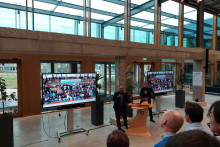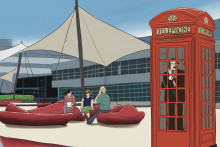The white paper ‘International Dimensions of the University of Twente’ outlines the UT's vision on what it means to be a ‘societally relevant and international university for the coming five years and beyond’. It was created based on consultations and workshops with dozens of people from within and outside the UT.
Based on existing policies
The resulting document is not meant to be seen as a new internationalization policy, stresses UT’s President of the Executive Board Vinod Subramaniam. ‘It is not something brand-new. It integrates existing vision, Shaping 2030, strategy and policies. It brings together all the threads, so that we can make a rope together. It’s one canvas of everything we already do and hope to do.’
‘The white paper was created to make people aware of how our internationalization strategy impacts everything and everyone at the university,’ says UT’s Rector Magnificus Tom Veldkamp. ‘It should serve as a background document, helping people to see implications of their decisions. It helps faculties, departments and individuals to see what steps we want to take and why – and perhaps help them define which steps they should take.’
Changes
The document is divided into three main sections, describing the UT as an international university from the students’, from staff members’ and from society’s perspective. It also contains a list of 27 changes needed to achieve the outlined ambitions. Those include, for example, increasing the number of student housing, arranging scholarships for students from less favourable circumstances, having explicit targets to stimulate diversity of staff and setting up a fully operational mentoring system for young academics.
‘These targets are certainly what we’d like to see happen,’ says Veldkamp. ‘I think reaching these ambitions is feasible. They are close to our core values as a university. However, these targets need to be taken up and embraced by faculties and the whole UT community. We can’t push this as the Board, it needs to be supported by the people. It needs to become part of our culture.’
‘Indeed,’ agrees Subramaniam. ‘The implementation and specific priorities will be decided together with the community. The white paper represents the overarching vision, the broad brush strokes. However, universities are very dynamic, they change and we need to be responsive to these changes. This is the direction we want to go, but I’m sure there will be surprises along the way.’
Awaiting advice
The white paper has been submitted to the University Council, which approved it this week. Based on the Council’s feedback, the final version of the document will be created and released.







